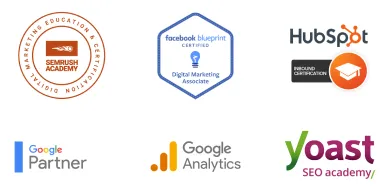TO LEARN IS TO GROW
Learning Center
We do our research and publish our results. Should probably call this the Growing Center.


How to Create an Effective Real Estate Website
To grow your customer base and ultimately your profit, you will need a real estate website. Using just social media networks is not enough.
If you’re a real estate broker or agent, using social media alone is not enough to help you succeed in a saturated market. If you want to grow your customer base and ultimately your profit, you also have to make sure that your website and other digital assets reflect your target market’s needs, lifestyle, and demographics.
Having a solid online presence starts with creating SEO- and user-friendly websites, allowing homebuyers and renters to “find” you as they type words into search engine tools such as Google and Bing!.
Benefits of Having an Effective Real Estate Website
Before we delve into the details involved in creating effective real estate websites, let’s look at how they can propel your business to success in terms of profit, customer base reach, and positive word of mouth.
A website that is designed for SEO, allows you to rank on Google and other popular search engines. One way to achieve a good ranking is to build a local listing on Google My Business.
A functional and effective website can turn “leads,” i.e., people who show interest in your service, into actual customers.
This digital asset can also guide your visitors to other platforms such as Facebook, Instagram, YouTube, Pinterest, newsletter, etc.
A user-friendly website can enhance your customer’s experience, particularly if you provide them “free” but valuable content. This is a powerful top-of-mind awareness technique that will help them remember you when they decide to make a purchase.

What Makes a Real Estate Website Effective?
Your website’s layout design, navigation, and user experience will be a deciding factor that will convince a visitor whether to leave or stay.
While there is some truth behind the cliche “beauty is in the eye of the beholder,” excellent real estate websites share similar traits. Simply put, there are “universal standards” that make some sites “functional and pleasing to the eyes.”
Incorporate Responsive Website Design
Your website must be mobile-friendly. Meaning that when a visitor uses his smartphone or tablet, the web page adjusts to the smaller screen. Remember, more than 90% of people use mobile gadgets to go online, according to recent surveys.
Aside from being mobile-friendly, a responsive real estate website also features the following designs and tools:
Viewing preference in portrait or landscape orientation.
Image-driven search results.
Property listing pages include location maps, property video tours, “descriptive” images, and other elements to improve user experience.
Catchy header with an outstanding logo design.
Easy-to-use website navigation and clean layout design.
Social media sharing capabilities (site visitors can share your blog post and other content with a click of a button).
Overall website design that reflects the brand, target audience, and real estate industry.
Use Call-To-Action Techniques
While the number of site visitors is a good indicator of your online visibility or lack thereof, another key performance indicator you have to keep in mind is the ratio between visitors and call-to-action clicks.
People who clicked CTA buttons have demonstrated their interest in your property listing, although it doesn’t mean that you should stop “nurturing” these leads. In fact, even after the purchase, you should continue engaging with them through emails, social media posts, etc. Remember, your customer base is the best promoter and “influencer” for your business.
Samples of CTA Strategies:
Write “Read more,” “Search,” “How it works,” or “Discover more” to help your visitors navigate your website easily.
Create quizzes and assessment tests, e.g., “List your property for free” or “Get my home value,” to stoke their interest and get contact details (or at least their email) in exchange for the results.
Include CTA phrases such as “See the exact location,” “Ask for more details,” and “Request for a virtual tour” to give your visitor more valuable information.
Include CTA phrases such as “Schedule a visit,” “Call me,” and “Contact our agent” to encourage your visitor to contact your real estate agent or sales rep.
Post Interesting Contents Related To The Real Estate Industry
You can’t disregard the name of your business or brand in your keyword strategy. After all, you never know when people might search for your business’s name after learning it from Craigslist, a friend, or an outdoor sign outside your office.
Also, prospects who search for your name are more likely to convert to high-quality leads. While competitors may bid on your name and steal your leads by appearing above your organic listing.
Create An Easy-to-Navigate Website.
Not everyone who visits your site may be able to use your search tool for navigation. Thus, place “quick search bar tools” that are visible on your home screens and inner page margins to make your site user-friendly and easy to navigate.
Furthermore, include an advanced search page to allow site visitors to access property listings they want to check. Also an interactive map search page to help them locate the property and its surrounding areas and nearby landmarks (e.g., hospitals, schools, restaurants, grocers, etc.)
Take Advantage Of Word-of-Mouth Marketing
You can turn your leads and actual customers into a potent word-of-mouth marketing tool. For this, post positive client testimonials on your site and answer inquiries posted on the comment box. Studies have shown that people trust customer’s reviews the same way they believe in their friend’s and family’s recommendations.
You may want to consider having a dedicated web page featuring testimonials and recommendations from happy customers and business partners.
Another way to boost your word-of-mouth tactic is to post your key affiliations and local community partners on your website.
Make Your Website A Reputable Online Source
Instead of relying on third parties such as property finder websites to boost your online presence, why not make your site a go-to place for homebuyers and renters?
The idea is to make your site an “authority” source for people who want an all-encompassing website where they can find real estate properties, home design, landscape, recreational activities, lifestyle, and local events.
Other content you may want to share:
Market trends and news for property investors and developers.
Property’s value.
Mortgage calculator for homebuyers.
Complete guide for homebuyers and sellers.
Integrate CRM On Your Website
Your real estate website must be integrated with your customer relationship management or CRM. The goal is to make everyone on the customer-facing team (e.g., digital marketers, sales reps, brokers, and agents) work side by side.
For instance, the real estate agent should already know the client’s basic information like name, his needs based on his lifestyle, and his preferred property type even before they meet for a house tour.
Use Website Analytics
In a nutshell, web analytics is a process that collects and analyzes data to improve website effectiveness.
Web analytics look at key performance indicators such as the overall traffic, desktop vs. mobile users, new and returning visitors, and bounce rate. It also considers audience behavior and campaign data, like which campaigns drove the most traffic and the keyword searches that lead to a visit.
A Final Word About Creating An Effective Real Estate Website
While the real estate industry has become a saturated market, it remains possible to grow your profit and reach more customers through ingenious marketing techniques and customer-focused service, especially in the digital platform.
Never skimp on the design and functionality of your website as visitors associate these features with “trustworthiness” and “security.” Thus, you may want to hire a professional web developer that also offers SEO and digital marketing services to boost your online presence and brand.

How to Create an Effective Real Estate Website
To grow your customer base and ultimately your profit, you will need a real estate website. Using just social media networks is not enough.
If you’re a real estate broker or agent, using social media alone is not enough to help you succeed in a saturated market. If you want to grow your customer base and ultimately your profit, you also have to make sure that your website and other digital assets reflect your target market’s needs, lifestyle, and demographics.
Having a solid online presence starts with creating SEO- and user-friendly websites, allowing homebuyers and renters to “find” you as they type words into search engine tools such as Google and Bing!.
Benefits of Having an Effective Real Estate Website
Before we delve into the details involved in creating effective real estate websites, let’s look at how they can propel your business to success in terms of profit, customer base reach, and positive word of mouth.
A website that is designed for SEO, allows you to rank on Google and other popular search engines. One way to achieve a good ranking is to build a local listing on Google My Business.
A functional and effective website can turn “leads,” i.e., people who show interest in your service, into actual customers.
This digital asset can also guide your visitors to other platforms such as Facebook, Instagram, YouTube, Pinterest, newsletter, etc.
A user-friendly website can enhance your customer’s experience, particularly if you provide them “free” but valuable content. This is a powerful top-of-mind awareness technique that will help them remember you when they decide to make a purchase.

What Makes a Real Estate Website Effective?
Your website’s layout design, navigation, and user experience will be a deciding factor that will convince a visitor whether to leave or stay.
While there is some truth behind the cliche “beauty is in the eye of the beholder,” excellent real estate websites share similar traits. Simply put, there are “universal standards” that make some sites “functional and pleasing to the eyes.”
Incorporate Responsive Website Design
Your website must be mobile-friendly. Meaning that when a visitor uses his smartphone or tablet, the web page adjusts to the smaller screen. Remember, more than 90% of people use mobile gadgets to go online, according to recent surveys.
Aside from being mobile-friendly, a responsive real estate website also features the following designs and tools:
Viewing preference in portrait or landscape orientation.
Image-driven search results.
Property listing pages include location maps, property video tours, “descriptive” images, and other elements to improve user experience.
Catchy header with an outstanding logo design.
Easy-to-use website navigation and clean layout design.
Social media sharing capabilities (site visitors can share your blog post and other content with a click of a button).
Overall website design that reflects the brand, target audience, and real estate industry.
Use Call-To-Action Techniques
While the number of site visitors is a good indicator of your online visibility or lack thereof, another key performance indicator you have to keep in mind is the ratio between visitors and call-to-action clicks.
People who clicked CTA buttons have demonstrated their interest in your property listing, although it doesn’t mean that you should stop “nurturing” these leads. In fact, even after the purchase, you should continue engaging with them through emails, social media posts, etc. Remember, your customer base is the best promoter and “influencer” for your business.
Samples of CTA Strategies:
Write “Read more,” “Search,” “How it works,” or “Discover more” to help your visitors navigate your website easily.
Create quizzes and assessment tests, e.g., “List your property for free” or “Get my home value,” to stoke their interest and get contact details (or at least their email) in exchange for the results.
Include CTA phrases such as “See the exact location,” “Ask for more details,” and “Request for a virtual tour” to give your visitor more valuable information.
Include CTA phrases such as “Schedule a visit,” “Call me,” and “Contact our agent” to encourage your visitor to contact your real estate agent or sales rep.
Post Interesting Contents Related To The Real Estate Industry
You can’t disregard the name of your business or brand in your keyword strategy. After all, you never know when people might search for your business’s name after learning it from Craigslist, a friend, or an outdoor sign outside your office.
Also, prospects who search for your name are more likely to convert to high-quality leads. While competitors may bid on your name and steal your leads by appearing above your organic listing.
Create An Easy-to-Navigate Website.
Not everyone who visits your site may be able to use your search tool for navigation. Thus, place “quick search bar tools” that are visible on your home screens and inner page margins to make your site user-friendly and easy to navigate.
Furthermore, include an advanced search page to allow site visitors to access property listings they want to check. Also an interactive map search page to help them locate the property and its surrounding areas and nearby landmarks (e.g., hospitals, schools, restaurants, grocers, etc.)
Take Advantage Of Word-of-Mouth Marketing
You can turn your leads and actual customers into a potent word-of-mouth marketing tool. For this, post positive client testimonials on your site and answer inquiries posted on the comment box. Studies have shown that people trust customer’s reviews the same way they believe in their friend’s and family’s recommendations.
You may want to consider having a dedicated web page featuring testimonials and recommendations from happy customers and business partners.
Another way to boost your word-of-mouth tactic is to post your key affiliations and local community partners on your website.
Make Your Website A Reputable Online Source
Instead of relying on third parties such as property finder websites to boost your online presence, why not make your site a go-to place for homebuyers and renters?
The idea is to make your site an “authority” source for people who want an all-encompassing website where they can find real estate properties, home design, landscape, recreational activities, lifestyle, and local events.
Other content you may want to share:
Market trends and news for property investors and developers.
Property’s value.
Mortgage calculator for homebuyers.
Complete guide for homebuyers and sellers.
Integrate CRM On Your Website
Your real estate website must be integrated with your customer relationship management or CRM. The goal is to make everyone on the customer-facing team (e.g., digital marketers, sales reps, brokers, and agents) work side by side.
For instance, the real estate agent should already know the client’s basic information like name, his needs based on his lifestyle, and his preferred property type even before they meet for a house tour.
Use Website Analytics
In a nutshell, web analytics is a process that collects and analyzes data to improve website effectiveness.
Web analytics look at key performance indicators such as the overall traffic, desktop vs. mobile users, new and returning visitors, and bounce rate. It also considers audience behavior and campaign data, like which campaigns drove the most traffic and the keyword searches that lead to a visit.
A Final Word About Creating An Effective Real Estate Website
While the real estate industry has become a saturated market, it remains possible to grow your profit and reach more customers through ingenious marketing techniques and customer-focused service, especially in the digital platform.
Never skimp on the design and functionality of your website as visitors associate these features with “trustworthiness” and “security.” Thus, you may want to hire a professional web developer that also offers SEO and digital marketing services to boost your online presence and brand.
Growing Businesses Since 2008
We have helped hundreds of businesses just like yours. Working for or along-side of business owner, managers, staff, or even board of directors, LOJO is ready to be an asset to your business.
Our team has been curated through the years for individual skills, personalities, and capabilities. Our clients put their trust in us to help them grow. We are here to do just that.



Growing Businesses Since 2008
We have helped hundreds of businesses just like yours. Working for or along-side of business owner, managers, staff, or even board of directors, LOJO is ready to be an asset to your business.
Our team has been curated through the years for individual skills, personalities, and capabilities. Our clients put their trust in us to help them grow. We are here to do just that.




Matthew Rogers, President
iProspect Check
After spending several months reviewing multiple proposals from several different companies we engaged LOJO to develop a new website that represents our company effectively. We worked initially with Stephen Platte who helped create the scope of the project. Stephen was knowledgeable and always followed up with me on time and as promised.
He "closed the deal" for LOJO with his professionalism, service orientation and easy going approach. Once we signed the contract we were introduced to Jay Kelly who would be the creative lead for LOJO. This was the most challenging part of the project for my company, as there was no shortage of ideas from our side. Jay managed the project flawlessly, and once we had all agreed to the design, Jay introduced us to Eric.
Eric Lay is one of the founders of LOJO. Eric took the design we had developed and brought it to life. We delivered content as quickly as he requested it. Eric kept the project on task and we responded by exceeding every deadline for content. In turn, once provided, literally not a day went by that Eric didn't add the content and take the next step. In just a few weeks we launched our new website. Eric is a pleasure to work with.
His positive attitude and consultative approach really enhanced the experience and made a big difference for us in the outcome of our project. We would welcome you to visit our website to take a look at the quality work of LOJO. We are very pleased with LOJO and look forward to working with them in the future as we pursue an aggressive SEO strategy."
After spending several months reviewing multiple proposals from several different companies we engaged LOJO to develop a new website that represents our company effectively. We worked initially with Stephen Platte who helped create the scope of the project. Stephen was knowledgeable and always followed up with me on time and as promised.
He "closed the deal" for LOJO with his professionalism, service orientation and easy going approach. Once we signed the contract we were introduced to Jay Kelly who would be the creative lead for LOJO. This was the most challenging part of the project for my company, as there was no shortage of ideas from our side. Jay managed the project flawlessly, and once we had all agreed to the design, Jay introduced us to Eric.
Eric Lay is one of the founders of LOJO. Eric took the design we had developed and brought it to life. We delivered content as quickly as he requested it. Eric kept the project on task and we responded by exceeding every deadline for content. In turn, once provided, literally not a day went by that Eric didn't add the content and take the next step. In just a few weeks we launched our new website. Eric is a pleasure to work with.
His positive attitude and consultative approach really enhanced the experience and made a big difference for us in the outcome of our project. We would welcome you to visit our website to take a look at the quality work of LOJO. We are very pleased with LOJO and look forward to working with them in the future as we pursue an aggressive SEO strategy."

Matthew Rogers, President
iProspect Check
The team at LOJO were wonderful to work with. They are well organized and very patient as we worked through our marketing strategy and developed a well thought out and clear action plan at a reasonable price. We will definitely be back for our future campaign needs."

Jon Crosby, Founder
Dazil

